What I told the Democracy Summit audience last week
I gave a keynote talk. I called it: "Building Back a Better Democracy"
(Last week, I gave a keynote presentation at Colorado State University’s annual Democracy Summit. I had a great time meeting with faculty and students in Fort Collins, CO. I am grateful for the invitation. Below, I share my prepared remarks, interspersed with some photos from the event. The college newspaper has this nice write-up of the speech)
Last October, a striking survey revealed something profound about our national psyche.
Pollsters asked voters whether they thought the country would suffer 'permanent damage' if their side lost.
And do you know what percentage of Americans said yes?
87 percent.
That's right. Almost 9 out of 10 Americans now view elections not as routine transfers of power, but as existential battles for the nation's soul.
And if the pollster had called me, I would have been among that 87 percent. Perhaps you would have as well.
Now, barely six weeks into the second Trump administration, I'm even more convinced I was right. We are suffering permanent damage.
So what do we do about it?
That is what I want to explore with you today.
We stand at what future historians will likely mark as a critical juncture in American history.
So the question is: what comes next?
I have some ideas.
The vision I want to present today is what I call fluid pluralism — a politics of shifting coalitions, overlapping identities, and multiple parties, where cooperation becomes possible precisely because no victory or defeat ever feels permanent
But getting there is going to require some hard work and transformative reform. We face a fundamental system problem. And a fundamental system problem requires a system-wide solution.
We need big change, and that involves transforming our electoral system.
***
Let me give you an overview of where we're going today.
First, I want to explore how we actually form our political beliefs. I think this is crucial because too many people hold onto the idea that we can just somehow persuade people we disagree with that they were wrong, and that we can just message our way out of this crisis through better information and education. We can't. It runs much deeper.
Next, I'll take you through what I call the "two-party doom loop." I'll discuss how we got trapped in this escalating cycle of partisan conflict that's tearing our democracy apart. I'll trace how our political system transformed from flexible and multidimensional to rigid and one-dimensional. This represents a system problem. It requires a system solution.
Then I'll make the case for electoral reform to rebuild fluid pluralism. Specifically I will argue for proportional representation to break the two-party doom loop.
Finally, I'll talk about concrete steps we can take to implement these reforms. Despite the grim moment we're in, I believe there's still a path to revitalizing American democracy – if we're willing to reimagine some of its fundamental structures.
So let's start the journey by looking inward — at ourselves, and how we make sense of the confusing political reality around us.
***
The fundamental challenge of self-governance is how we resolve our disagreements without resorting to violence. But where do these disagreements even come from? Why don't we all see the world in the same way?
Modern liberal democracy emerged from the Enlightenment, rooted in scientific thinking and the belief that independent, rational thought can lead us toward universal truths.
This may hold true at the collective level, but only when we embrace a diversity of perspectives.
But at the individual and group level, it may actually be closer to its opposite. That is, that all that education and knowledge we now have virtually guarantee our disagreements will intensify—because we have more tools at our disposal to argue with each other and convince ourselves that we are in the right!
We all want to believe we see the world as it truly is—that we possess clarity while others remain clouded by bias. It's a comforting thought, but deep down, we know it's not true.
None of us has the full picture. We're all looking through our own unique windows, shaped by our experiences.
We are shaped even more by those around us. We yearn to belong—to a family, a team, a community. We want to feel valued and respected by the people around us. These desires to fit in shape our reality far more than some abstract pursuit of truth.
I'm no different. As a second-grader, I was the kid who support Walter Mondale in our class straw poll while my classmates overwhelmingly chose Ronald Reagan—simply because I grew up in a Democratic household. I thought Ronald Reagan was bad because that's what I was supposed to think as an eight-year-old kid of two Democratic parents. Maybe he was?
I went to Brown University where, looking back, I'm not sure I knew a single Republican. I solidified some pretty lefty views back then.
Over the last decade, I've diversified my ideological networks a bit more. But if I'm honest, I still see the world through powerful filters shaped earlier in my life—by my experiences, my community, and those long-ago formed values.
I instinctively filter out facts that challenge my worldview. How else could I stay sane?
Yes, sometimes, I'm curious. And so I'll deliberately read some right-wing news sites.
When I venture into that world, I discover I'm watching an entirely different movie unfold. Similar events, similar characters, but with the heroes and villains completely reversed.
Democrats transform from well-meaning progressives into calculating radical Marxists. MAGA Republicans aren't extremists—they're principled heroes fighting for American values.
The perspective shift is jarring—it's like watching Wicked after seeing The Wizard of Oz
Bottom line: the stories we believe shape the realities we perceive.
***
So who's right? Well, I am, of course. Right? But let me ask you: am I? Are you? When did you last truly change your mind about something important?
We might call this flawed thinking 'confirmation bias.' We might think we should do better. But isn't this simply our nature? Our brains methodically weave reality into narratives where we emerge as the righteous heroes of wisdom. We care about our good standing within our communities.
Except for those few freaks and weirdos among us, the vast majority prioritize belonging and social cohesion above almost everything else. From an evolutionary standpoint, this was a remarkably smart strategy. We needed each other after all.
The consistent finding across social psychology is that most people care more about fitting in than seeking out some abstract truth.
Normally, this doesn't need to be a problem. The world is diverse. People come to different conclusions based on their experiences, their social networks, and who they want to impress.
And a lot of our differences are pretty trivial. The Denver Broncos could be the best football team. But others might champion the Chiefs instead. And it doesn't amount to much in the end. (Or does it?)
But when our preference for group cohesion and status turns disagreement into existential threat, we have a big, huge, humongous problem.
We saw this powerfully with election denialism. People who couldn't accept their side lost the 2020 election found others who shared their view. At some point, this transformed into a shared social truth. It became as much a signal of whose side you were on as anything else.
But here’s the uncomfortable truth. Our political disagreements really aren't about facts, and never have been—they're about identity, belonging, and status.
When this conflict becomes binary and zero-sum, it becomes all but impossible to resolve.
When our perceived realities no longer overlap, we lose the shared language needed for empathy.
And without empathy, the face of the opponent begins to blur. Their humanity fades. In the twisted logic of extreme us-versus-them conflict, radical action—even physical harm—starts to feel justified.
And this brings us to our current crisis: are we trapped in what some might call a two-party doom loop?
***
Sixty years ago, American democracy was a two-party system, but in name only. Both parties contained multitudes. Democrats and Republicans each housed liberals, moderates, and conservatives. Local politics mattered more than national politics.
This diversity within the parties created real fluid pluralism. This pluralism created flexibility. New issues didn't automatically map onto existing partisan divides. New coalitions were always possible.
Not anymore.
Today, every single issue of national importance is partisan. Local variety is gone. All politics is national. Our political landscape has flattened into one mega-conflict: us versus them.
And most dangerously, this binary structure simplifies and collapses the world into two opposing realities.
Remember how we form beliefs: through social networks, seeking belonging and status. Our two-party system now channels these human impulses into just two opposing identities. It's a recipe for escalating conflict.
So how did we get here?
The transformation began in the late 1960s. Social issues around race, culture, and religion grew more important in national politics. By the 1990s, the parties were aggressively nationalizing around cultural issues.
Then came the geographic sorting. Democrats retreated from rural areas. Republicans stopped bothering with cities. This created new partisan geographic echo chambers . These echo chambers amplified our natural confirmation bias into deafening proof that our side is right, and their side is wrong, and the battle for the soul of America is ON.
Unlike the local parties of yesteryear, rooted in the concerns of place, today’s parties are abstract floating presences. Professional pollsters and messaging gurus and fundraisers effectively run them. Their primary message? The other side threatens your very existence.
This drives the doom loop. Consistently close elections raise the stakes. High stakes strengthen coalition loyalty. Narrow margins of victory intensify conflict. Remember that statistic about 87% of voters believing America would suffer "permanent damage" if their side lost. In this context, it makes perfect sense.
A decade ago, many believed that eventually, "the fever would break." It hasn't. Instead, the fever may break is a sentence in search of a direct object, and the direct object is our democracy.
Nobody likes this. Well maybe a few are profiting off it.
But the overwhelming majority of Americans are screaming for something different. More than two-thirds want more than two parties. Yet incumbents win at at roughly a 97 percent rate. Most face no meaningful competition. Voters get the same two options, over and over again, and if we're honest, in most places, only one.
And when I look at the craziness coming out of Washington right now, I see the two-party doom loop is turning doom-i-er and loop-i-er with each passing day.
This can’t go on anymore.
We face a party system problem that demands a party system solution.
Since we form beliefs socially, we need political structures that support multiple overlapping perspectives capable of finding common reality—not just two that diametrically oppose each other. We need cross-cutting identities that prevent any single mega-conflict from defining everything.
We need what I call fluid pluralism—a political state where coalitions always shift and evolve. Where people have multiple overlapping identities and multiple sources of meaning. Where today's opponent might become tomorrow's ally on a different issue. This aligns with our social nature. It prevents the hardening of permanent battle lines.
And since elections are the central events of modern representative mass democracy, the most effective path to get there is by changing our electoral system.
***
So picture this: America with a Congress that truly reflects all of us and multiple parties that disrupt the simple us-versus-them mentality.
We can achieve this through a system of multimember districts with proportional representation.
Instead of 435 districts with just one winner each, we create larger districts. Each sends multiple representatives to Congress. Probably we also expand the size of the House
Your district elects five representatives. Your party wins 40% of the vote. Your party gets two seats. 40% of the 5 seats. Another party gets 20%. They get one seat.20% of the seats
That's proportional representation—simple, fair, and more representative.
This isn't a some untested academic fantasy —most established democracies already employ this system successfully.
Fun fact:, the United States is one of only four stable or semi-stable presidential democracies using winner-take-all systems to elect their legislature. The others? Ghana, Liberia, and Sierra Leone.
Americans want change. Across polls, overwhelming majorities, 75%. 80%. 85%, say our system needs major reform.
This doom loop is destroying our democracy through high partisan division, low system legitimacy, and high citizen disaffection—precisely the conditions under which democracies typically crumble.
Political scientist Barbara F. Walter, who has written the book on how civil wars start, has observed that almost all of civil wars over the last century have broken out in countries with winner-take-all systems.
With multiple parties, our identities become cross-cutting rather than reinforcing. When you share economic views with one group and social values with another, no single conflict can define your entire political identity.
In multi-party systems, parties rarely win outright majorities and thus must form coalitions to govern, with today's opponents potentially becoming tomorrow's partners on different issues.
This fluidity prevents permanent battle lines from hardening into hatreds.
The call for reform isn't just coming from outside the House. Representatives Marie Gluesenkamp Perez and Jared Golden have proposed establishing a select committee to examine electoral reforms, including proportional representation.
I’ve talked to a number of members and more staffers. Nobody says things are working well. Retiring members candidly describe a Congress so chaotic and frustrating that it drives them away.
***
Now there are certainly other reform.
Some reformers claim that there is an "exhausted majority" in the middle and demand we force parties to respond to "median voters." But this misunderstands the problem entirely.
This "middle ground" analysis rests on fundamentally flawed assumptions. No single left-to-right axis can possibly capture the complex political values of all Americans. There's no sizable group of voters who all share the same "centrist" views. Most self-described "independents" are actually closet partisans who vote reliably for one party, even if they hate the idea of partisanship.
Some might say we should all be independents. But we need to belong to groups. And political parties are the central institutions, the main groups, that make modern representative democracy possible by structuring the alternatives and engaging and motivating voters.
The problem is that with only two partisan teams to choose from, defection risks severe social isolation. This is why after January 6, so many Republicans remained silent.
If we had a multiparty system, non-MAGA Republicans would have had a home where they could still be on the right, but not the Trump right. In our two-party system, they don’t. They can’t.
So we need reform.
For single-winner offices like governors or senators, fusion voting offers a complementary solution. It allows candidates to appear on multiple party lines.
Fusion is legal in New York. The Working Families Party there can endorse candidates who support their priorities. Voters can support these candidates while expressing their specific values. It’s not full multiparty proportional representation, but it’s a step closer than single winner plurality elections without cross-endorsement
***
Certainly, no voting system is perfect. Let me address a few obvious criticisms directly
"But multiple parties would create gridlock and chaos!"
Evidence shows the opposite of what critics claim about multiple parties leading to paralysis. Multi-party systems necessitate cooperation through coalition-building. It’s hard work. It takes time. But it does happen.
Meanwhile, our current Congress rewards obstruction.
The chaos argument overlooks our present reality—a system where the House struggles for days just to elect a Speaker and government shutdowns have become routine.
"America has always had two parties—it's our tradition!"
This perspective overlooks our actual history. The Founders never intended a two-party system. Both Madison and Adams explicitly warned against it.
What's truly American is innovating pragmatically when systems fail, not clinging to traditions that no longer function.
"Proportional representation would weaken majority rule."
Our current system frequently produces what amounts to "minority rule"—parties with less than 50% of votes controlling 100% of power. Or really, a faction in a plurality party controlling 100% of the power.
Proportional representation ensures that governing majorities must represent actual voting majorities.
"Small radical parties would gain too much power."
Evidence from established democracies shows extremist parties typically gain some representation but remain contained.
In Germany, despite the far-right party winning 20% of votes, they will remain outside government because mainstream parties can govern without them.
Our current system, ironically, ends up empowering extremism by giving leverage to the hardliners who can credibly threaten to blow everything up.
"We'd need to abandon our presidential system."
Actually… Most countries with presidential systems already use proportional representation for their legislatures. This combination thrives in numerous stable democracies worldwide.
Our presidents would continue to be elected as they are now. But they would work with a Congress that better reflects and represents the full diversity of American pluralism.
***
We Americans celebrate our spirit of innovation. So why are we stuck with this 18thcentury default operating system that we thoughtless copied from the British?
Our two-party system exists not by constitutional design, but because of merely eight words in a 1967 federal law requiring "no district to elect more than one representative." We can change that. It’s statute.
Reforming our electoral system requires no constitutional amendment. Congress could enact proportional representation and fusion voting with a single piece of legislation. Colorado could independently transform how it conducts its own legislative elections.
The voting process would mostly feel the same. You would still receive your ballot and select your preferred representatives. The difference lies in expanded choice: more candidates, more parties, and representation fairly awarded in proportion to each party's vote share across multi-winner districts.
When our current era of political destruction finally burns itself out—as history promises it must—we will face the monumental task of rebuilding. Electoral reform represents not just another tool, but our most powerful instrument for democratic renewal.
The path forward is clear. To me. The question remains: Will we summon the courage to take the first step, or will we continue to surrender our democracy to a system our founders never intended?
***
Now, in the past this is where I would end my remarks. I'd make a passionate call for electoral reform.
Then during questions, someone would inevitably ask: "Well, sounds great, but could something like this really happen?" And I would fumble through an answer about long shots and eventual crises driving demand for transformation.
It has been five years now since I published Breaking the Two-Party Doom Loop.
And some things have changed.
First, our democracy has gotten considerably doom-ier and loop-ier. There is no rebuilding the status quo. We must imagine something new. And for sure, more people are coming to the same conclusion.
Second, proportional representation now finds champions. Protect Democracy, a major democracy reform group, now commits substantial resources to reform. Harvard Law School launched the Guinier Project on electoral systems. The American Academy of Arts and Sciences is about to publish a major report on proportional representation Even House members openly advocate for change.
Multiple advocacy organizations now target state-level proportional representation campaigns for 2026 or 2028 at latest.
Another question I would alway get was this "Well, sounds great, but what can I do?"
And I’d hesitate. What can one person do?. I'd offer vague suggestions about following reform organizations. Perhaps mention contacting your representatives. All of it would feel rather meh.
But now I think about it a little differently. Now my first advice isn’t about supporting reform directly. It’s this : Be a Good Neighbor. Connect with your community. Look out for one another. Democracy thrives through human connection. Connected, supported people become engaged citizens who effectively navigate differences and organize for collective power.
When people feel isolated and powerless, resentment festers. That resentment becomes dangerous to self-government. It makes us vulnerable to authoritarian appeals that offer a false sense of belonging.
***
As I thought more about the community level, I started to ask: What if political parties built year-round presences in communities instead of just harassing people for money around election time? Imagine a Democratic Club or Republican Club that hosts community events. Days of service. Discussion groups. Workshops for students. Help for residents navigating government programs. Friends and neighbors gathering regularly. Politics becoming relationship-based rather than distant and abstract.
Is this crazy? Not really. Parties once operated this way. The old machines had problems, certainly. But they created belonging. They recognized our social nature.
But under our two-party competition, where Democrats and Republicans have carved up the country into two competing one-party territories, there is little reason for parties to invest in year-round community organizing. And even in places where they do invest, it's all about beating the other side.
This is why I see electoral reform as so fundamental. Imagine if multiple parties were competing in the same place, and offering community engagement opportunities. This is what proportional representation might encourage.
But increasingly, I think this has to go beyond politics. It's also about building up community organizations that give people some shared purpose. Maybe it's just as simple as a neighborhood improvement project. Places where you might work alongside someone who votes differently but also cares about making the community look a little nicer.
Maybe there's a competition among neighborhoods — nothing brings people together like a little healthy rivalry. Then perhaps different neighborhoods team up against other neighborhoods. Or different cities collaborate against other cities to compete for who has the most beautiful parks, or the most vibrant Main Street.
Something that brings shared energy and pride. Something that offers positive belonging.
People hunger for meaningful participation. For projects that create visible impact. For recognition of their efforts.
Start where you are. Join local organizations. Create spaces for genuine connection. Build shared purpose. Talk about electoral reform. Support proportional representation advocates.
It's time for something new. The path out of our democratic crisis cannot be through more of the same. It cannot be through hoping our two parties suddenly work together. It cannot be through one side crushing the other. It cannot depend on one side suddenly realizing it was wrong.
The answer has to come from a richer, more fluid pluralism. We should disagree. We should come to different conclusions. We should belong to different organizations, have different identities. Some of these identities should overlap. Some should compete. But no single fight should be so existential, so all-or-nothing, so permanent that we are willing to undermine our democracy to win it.
We need to break the two-party doom loop and support multiparty proportional representation. But we also need to build up faith in each other. We need to invest in new ways to work together, towards common purpose. We need healthy political parties, locally rooted. We need civic organizations that engage in big collective projects.
***
Now I know we are up against an existing power structure that rejects transformative change.
Leading Democrats remain cautious. They believe they can succeed through better messaging, more facts, or voter mobilization strategies that have remained elusive. I've tried to show why this approach will fail.
The issue lies in how we see the world. We see it through groups and social identities. And the stacking of all these identities into just two opposing parties transforms all our policy disagreements into existential conflicts. But it doesn't have to be this way.
Today, we confront a constitutional crisis. Unprecedented strain threatens our democratic institutions. But History shows us that moments of crisis are also moments of opportunity. The Progressive Era emerged from the Gilded Age's chaos—a time like ours, when inequality soared, corruption flourished, and democracy faltered.
That period of instability sparked democratic innovations: direct election of senators, women's suffrage, and reforms that strengthened American self-government.
Those reformers reimagined democracy at America's 125-year mark.
Now, approaching our 250-year milestone, we face a similar challenge. The current order is cracking Our institutions are straining. The rigid binary system that has dominated our politics is breaking apart under its own weight.
But I do honestly believe that in the near future, we’ll have a chance to construct something better. So the choices we make now matter—the ideas we nurture, the communities we strengthen, the reforms we champion. These become the blueprint for what rises from the rubble.
So I ask you: What kind of democracy do you want to see emerge? What kind of democracy do you want to build?
This work begins today—in our neighborhoods, in state legislatures that can pioneer these reforms, and ultimately in reimagining our national institutions for America's next 250 years. Our democracy wasn't designed to be static—it was designed to evolve. And evolve it must.
Our constitutional challenges loom large. But we are not sleepwalkers, fated for disaster. We stand fully awake. We know the status quo is unacceptable.
So enough with the doom and gloom. The time demands action.
Let's reimagine. Let's rebuild. Let's turn this mess around.




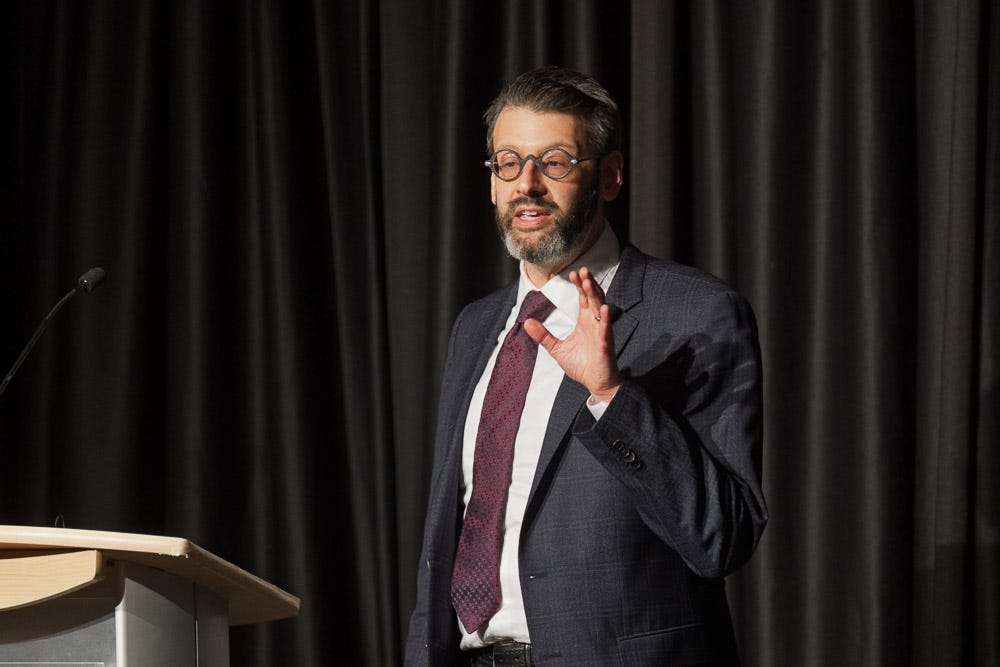
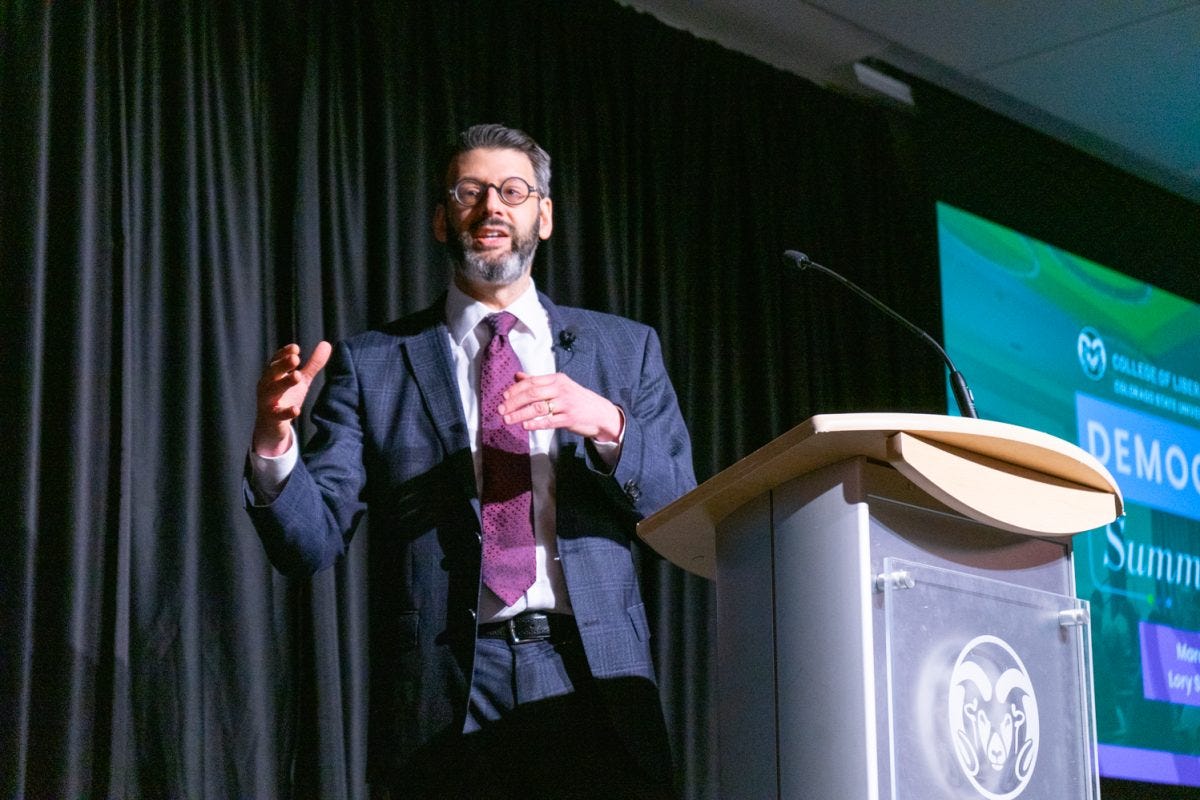
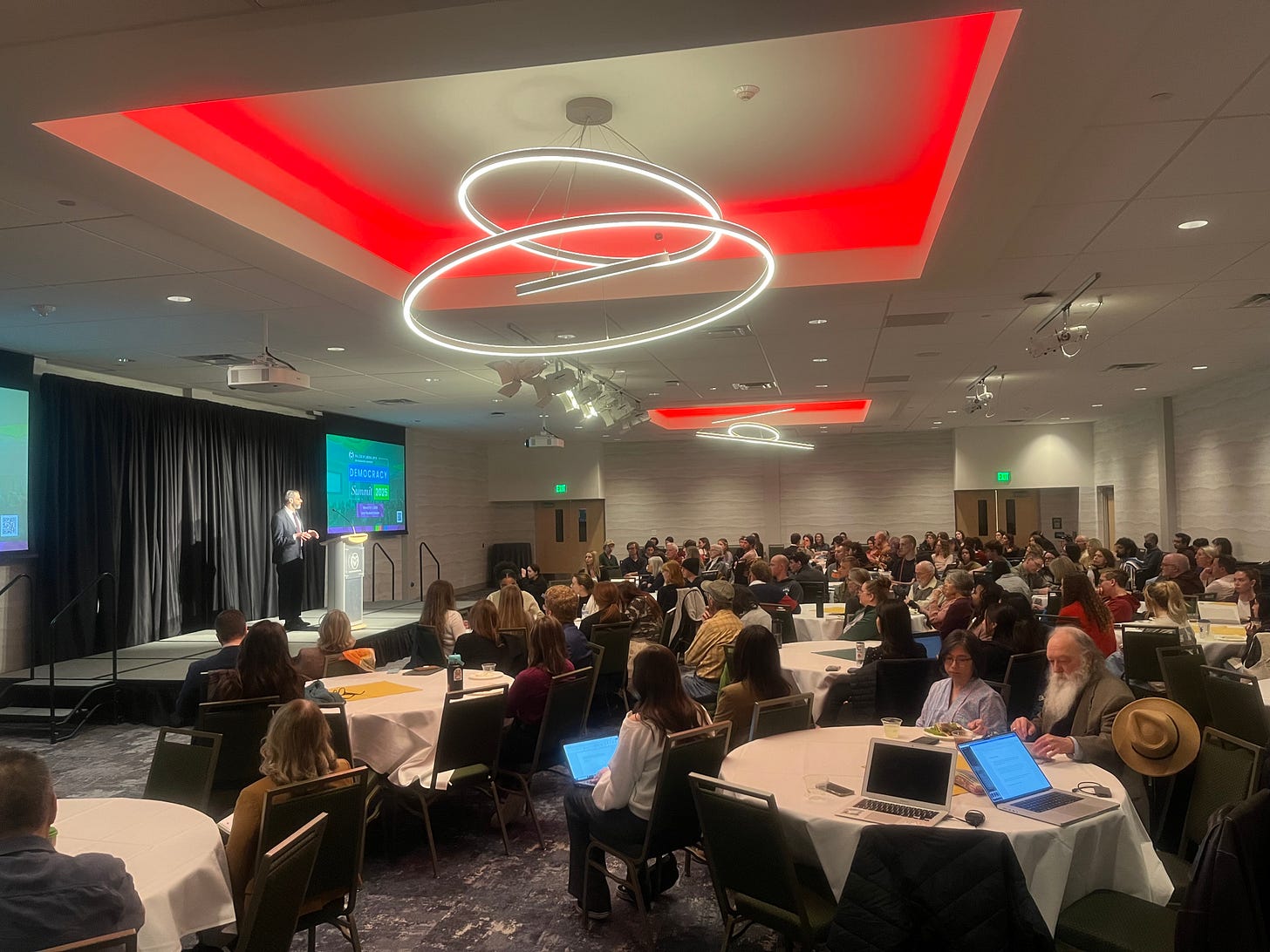

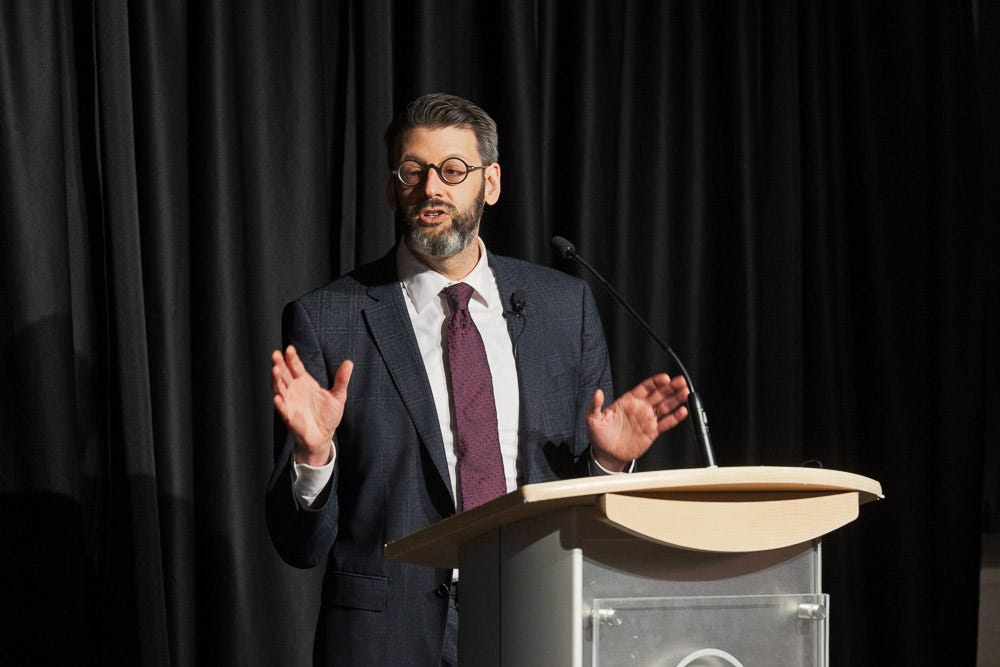
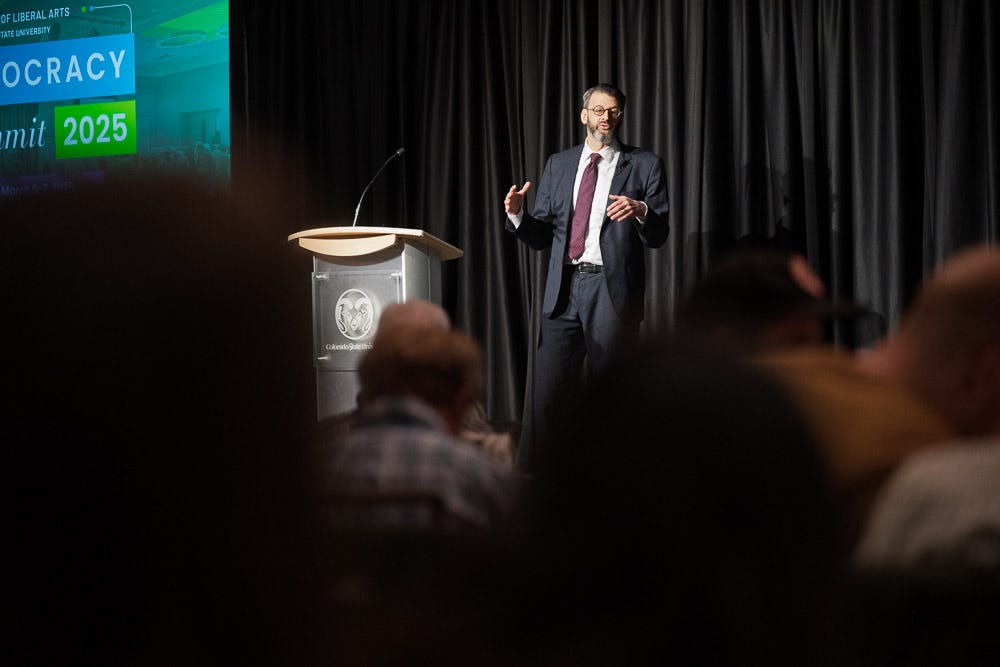

Three of my last five blog entries (and a lot of earlier ones) regard polarization and what can be done about it. One of them focuses on your book. https://luckorcunning.blogspot.com/
Lee
Ok, we have a political system that doesn’t work. And, in principle, we know (or can accept as logical) that eliminating the bans on fusion voting would, over time, lead to multiple parties. And that would lead to lots of positive downstream effects. Proportional representation might emerge. And more compromise and less fear, resentment and hatred.
But (there is always a but) your analysis leaves off the key factor that leaves us stuck.
We are stuck because ALL the political players are frozen by our combination of campaign finance and expensive primary elections. In your old New America analysis you concluded that the effect of “being primaried” attempts and (more relevantly) threats to do so (now often wielded by Trump) worked to shut off compromise and keep legislators locked in their leadership-driven policy straight-jacket.
You mention the frustration of recently retired politicians. Yet their complaints are never echoed by the incumbent in-office ones. The “truth” of the situation (that their own waking hours are almost completely dominated by a life spent seeking money from wealthy and special interest donors) is NEVER prominently highlighted by politicians except to point accusations at the OTHER party.
What is desperately needed is frank TRUTH. Open discussion about the campaign finance trap they ALL (both parties) find themselves in. The public strongly suspects money is deeply involved. But they have never heard it from the incumbents. They have, of course, heard lots of blame being used, but not the air-clearing Mea Culpa. Please look at the positive effect such confession would do for the Democrats if they were brave enough to try it.
With the air cleared, the Democrats could dust off (or, better, rewrite along the lines of my essay https://michaelfoxworth.substack.com/p/national-democracy-dollars-details
) the campaign finance voucher program they included in the 2022 filibustered HR1 (and then proceeded to never talk about).
Currently, the Democrats are demoralized and disgusted with their weakness (such as today’s cave-in on the Continuing Resolution by Senate democrats). The independents and even those who are having Trump buyer remorse have little reason to hold out hope.
Hope is desperately needed.